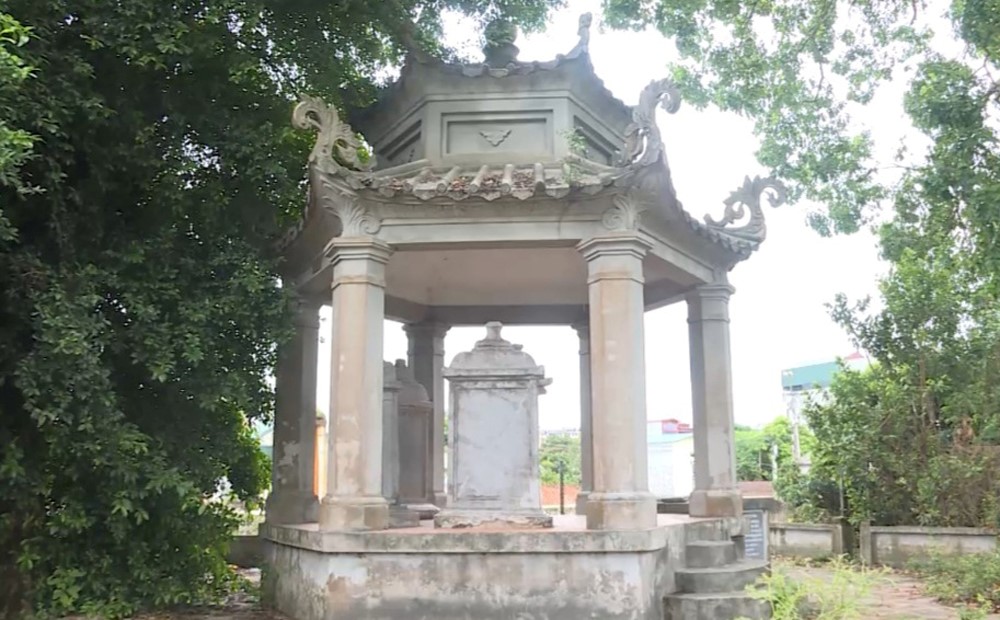Scholar-producing villages in An Thi
Hung Yen is a land of culture, learning, and valuing talent, the birthplace of many national scholars. An Thi proudly contributes to this value with many scholarly villages and families renowned throughout the country. In nearly 10 centuries of imperial examinations, An Thi district has produced 41 top-ranking scholars.
 |
| The Phu Ung Village Scholar's Pavilion is located within the Phu Ung Temple historical and cultural relic complex. |
Thổ Hoàng, meaning "golden land" in Chinese, is now Thổ Hoàng Cả in Ân Thi town (Ân Thi). According to historical records, Thổ Hoàng village was formed nearly 2,000 years ago. It is considered a blessed land, with a geographical formation resembling "seven stars converging," and the hamlets clustered in a circular shape.
From the time the feudal court opened examinations to select talented individuals to serve the country until the last examination, Tho Hoang village had hundreds of people who passed the Bachelor and Master's degrees in various examinations. Among them, 12 people passed the highest level of examinations, making it one of the 10 villages with the most prestigious examination traditions in the country's history. The most prominent among the scholars of Tho Hoang is Nguyen Trung Ngan - the first Hoang Giap (Imperial Scholar) of the Vietnamese feudal examination system. At the age of 12, he passed the Thai Hoc Sinh (Imperial Academy) examination, and at the age of 16, he passed the Hoang Giap (Imperial Scholar) examination (1304), the youngest Hoang Giap in the country and also the founding father of Tho Hoang village's examination system. Later, he served as an official, reaching the position of Nhap Noi Dai Hanh Khien (i.e., Prime Minister), with the title of Than Quoc Cong, leading the ranks of officials in the court. Serving under 5 kings of the Tran dynasty, Nguyen Trung Ngan excelled in all aspects of politics , military affairs, diplomacy, law, history, etc.
After Nguyen Trung Ngan, Tho Hoang had many people who passed the imperial examinations. Notably, some families had generations of fathers and sons, and grandfathers and grandsons, all achieving high academic success. For example, the Hoang family had five members who passed the imperial examinations, while the Vu and Nguyen families each had three. Currently, the Hoang family ancestral temple is one of the Confucian and scholarly relics of Hung Yen, dedicated to the ancestors of the Hoang family and the doctoral graduates within the family. Built in 1893, the Hoang family ancestral temple has been renovated and preserves a very valuable stone stele dating from the 17th century, composed by Doctor Tran The Vinh (Prefect of Khoai Chau).
According to historical records, the founding ancestor of the Hoang family in Tho Hoang village was Mr. Hoang Chan Tinh, a teacher who worked far away. Upon his death, his descendants brought him back to the village for burial. Mr. Chan Tinh had two sons. The eldest son remained in the village, while the younger son returned to Hoang Van and established the Hoang family in Van Noi, Hoang Van, Khoai Chau district, Son Nam province, now part of Hong Tien commune (Khoai Chau). Significantly, the Hoang branch in Van Noi is the maternal ancestral line of President Ho Chi Minh, established by Grand Tutor Hoang Nghia Kieu in Nghe An province, establishing a branch of the Hoang family in Hoang Tru (Nam Dan - Nghe An). Mrs. Hoang Thi Loan, President Ho Chi Minh's mother, was a daughter of the Hoang family from this area.
Phu Ung Village, Phu Ung Commune, is an ancient village surrounded by the Bac Hung Hai dike system and the Cuu An River. From ancient times, it has been known as a land with a tradition of valuing education. This tradition has been passed down by the people and inscribed on stone tablets as a reminder for future generations to inherit the scholarly legacy of their ancestors. The Tu Van Pavilion is a symbol of Phu Ung Village's tradition of valuing education.
The Scholar's Pavilion is located within the Phu Ung Temple historical and cultural relic complex. In the past, the Scholar's Pavilion was the stele house of the Temple of Literature. Four steles placed within the Pavilion record the names and achievements of those who passed the examinations in the village during the Le and Nguyen dynasties. These steles are of great cultural and historical value and are an important source of information for understanding the history of the examination system in Phu Ung village. The first stele states that the stele was erected to record the names of the examinations and the names of the successful candidates, then erected in the ancestral fields of the clans, with annual sacrifices made in January. This land has a long history of culture and civilization. The elders are virtuous, and many distinguished families have achieved success, bringing glory to the homeland. Erecting steles to record the examinations, followed by the names of the successful candidates from our village, is hoped to ensure that this example shines brightly and its good name endures for generations. May virtue not fade but shine brightly, passed down without being forgotten…
The village of Bình Hồ, in the former Quảng Lãng commune, was once renowned for its scholarly tradition in the Lưu Xá district. The Bình Hồ ancestral temple records that the village's literary tradition began with a scholar who passed the highest imperial examination. Since his passing, many others have achieved high positions in government, earning a prestigious reputation and truly glorifying the village's literary heritage. To encourage their descendants to pursue scholarly careers, the villagers established regulations for those who passed and pursued academic success. A stone stele at the temple records the reward system for successful candidates. Today, the Bình Hồ ancestral temple is not only a place for cultural activities but also a place to award prizes to outstanding students and those who achieved high rankings in examinations, continuing the village's tradition of studiousness, as the ancients said: "In the future, the path of scholarly pursuits will continue, and names will be inscribed on the golden list; will this be thanks to the expansion of this ancestral temple? This is the hope of many future generations" (recorded on the Bình Hồ ancestral temple stele)...
 |
| Temple dedicated to the renowned figure Nguyen Trung Ngan |
An Thi district still has many places that hold traditional educational significance, such as the Confucian scholarly site of Lau Tu Van, the ancestral temple of Doctor Vu Hong Luong (Phu Ung commune), the ancestral temple of Binh Ho (Quang Lang commune), the temple of the renowned figure Nguyen Trung Ngan, the Hoang family church (An Thi town), and the national historical and cultural relic of the Do family church in Quang Vinh commune. From these sites, we can further appreciate and be proud of the past, promoting and inheriting the spirit of our ancestors in building and preserving the enduring cultural heritage of the nation.
Dao Doan
Source link





































































































Comment (0)